
Tereza Leite, left, and Rani Abel, English language students at the Dover Adult Learning Center. Courtesy of the Dover Adult Learning Center.
In 2014 Tereza Leite, a journalist from Rio Piracicaba, Brazil, had a plan. She would travel to the U.S. on a press visa to work with the Brazilian community in Massachusetts, study English and return to her native country.
She accomplished all but the third item of her agenda before she met Richard Aliano on a blind date. They married in 2016, where in Wolfeboro, the 53-year-old Leite dug her heels into a midlife second act.
But the passport to a life reinvented wasn’t an easy one. For starters, she wasn’t ready to give up her passion for writing, which began early as a young girl when she published poetry and earned awards for her craft.
Language, which in Brazil came easily to her, was now a challenge to overcome. In 2016, she joined an English conversation group at the Dover Adult Learning Center (DALC), where she met people from different countries and professions, the majority with higher education degrees. She didn’t mind the 50-minute commute to Dover, she says, because she could practice her English and learn about American history and customs. “We became a small family,” she says of the other students who supported one another.
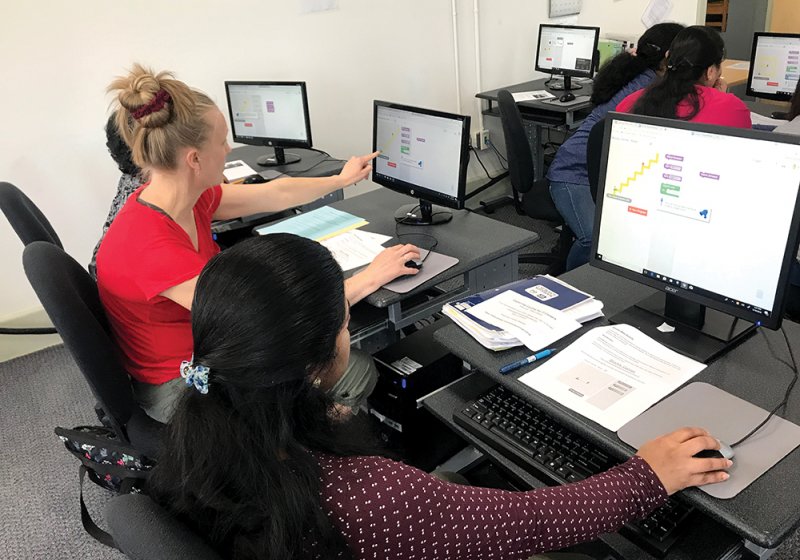
The Exploring Coding class at Dover Adult Learning Center. Courtesy photo.
And while the cultural exchanges expanded her knowledge of world views, her English language acquisition was not as fluid as it is for much younger learners, preventing her from landing American-based journalism work.
As often happens with professionals with language barriers, according to Deanna Strand, executive director of DALC, Leite changed careers, choosing to fill a need in her community as a licensed nursing assistant (LNA).
The cost for her books and studies with Dover LNA Health Careers, including a teacher to help her with her English, was paid for with federal grant funds through a partnership between DALC and NH Works, a state program that assists NH residents with job searches. She received her LNA license and in September joined the staff of Genesis, a short- and long-term rehabilitation facility in Wolfeboro Bay.
And while she still writes for a couple of Brazilian blogs, she also enjoys caring for people. “I think of my mother when I’m working.”
Expanding Offerings
Leite doesn’t fit the typical image of an adult learning center student. When most people envision these centers, they think of testing sites for dropouts to take their high school equivalency tests, or a blended community where immigrants with little education learn English and basic skills.
To be sure, these services continue to exist and thrive. Centers around the state offer tutorials for basic math, reading and writing skills.
However, the demographics of the student population changed after 2007 when NH raised the age students must attend school from 16 to 18. No longer were the course offerings serving mostly those in their late teens; they were also providing second chances to adults of all ages.
In addition to teaching essential subjects, adult learning centers around the state are aligning their programs with skills employers are looking for. For example, the center in Keene trains electricians, plumbers and mechanics; Laconia offers science courses to prep for nursing school; and Nashua certifies medical coders.
But what is taught and nurtured in these rooms crammed with metal chairs and laminate desktops and a cacophony of dialects is not solely focused on jobs. The classes provide connections and resources to individuals, like Ruth Hannon of Nashua, who often don’t know where to turn for career or family advice.
Hannon was about to turn 60 when she signed up for Nashua’s 80-hour medical coding certificate program this past winter. She struggled with anxiety and depression most of her life and by age 40 found her symptoms disabling, so despite a long career in hospital administration, she left the workforce for many years, to focus on getting well. A suggestion from a mental health counselor brought her to the coding class in Nashua. While much of the class is self-paced and online, she attended the instructor-led study sessions, mostly for camaraderie and a confidence boost.
“My best day was when I took the exam,” says Hannon. She passed in March on the first try. Hannon says the bigger hurdle was yet to come when staff members at the Nashua Adult Learning Center asked her to speak at a public event, a concept that elicited both horror and honor. But in the end, “it was a great experience,” she says. Hannon is currently working on her resume and interviewing for jobs.
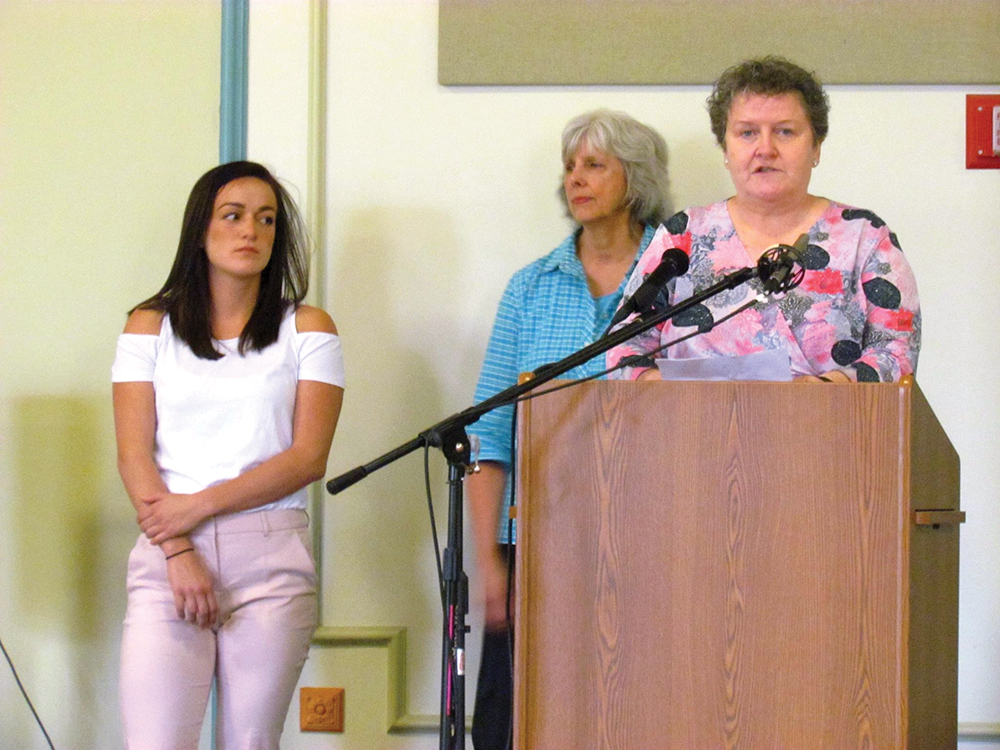
Ruth Hannon, right, gives a speech at the Nashua Adult Learning Center’s Breakfast With Our Best event as Stacey Anctil, supported employment specialist from Greater Nashua Mental Health Center, far left, and Nancy Heinlein, computer specialist at Nashua Adult Learning Center look on. Photo courtesy of Ruth Hannon.
Many centers, such as Keene Community Education (KCE), also offer enrichment classes where adults can pick up a paintbrush, hand roll Vietnamese appetizers, compose frame-worthy photos, and fulfill other communal aspirations. Janice Barry, executive director of KCE, says the classes fill up quickly, while generating revenue to support academic and vocational programs.
Bridging the Skills Gap
“It used to be the goal was the GED,” the high school equivalency test now known as HiSet, says Lauren Osowski, director of adult education at the Nashua Adult Learning Center (NALC). “Now the HiSet is the first step.”
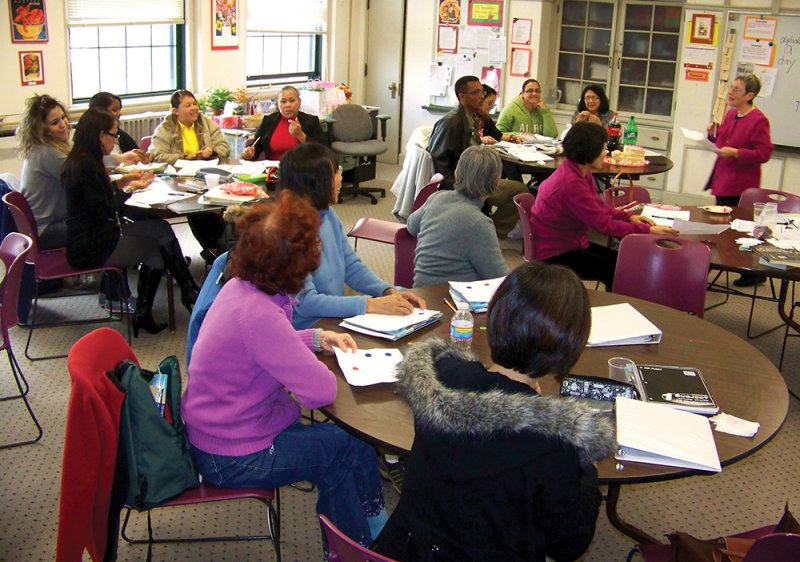
An adult education class at the Nashua Adult Learning Center. Courtesy photo.
In Nashua, Osowski says the center offers anyone with a high school equivalency diploma a free 8-week course that teaches essential computer skills, time management and note-taking to help prepare for college. The school also offers informal life coaching with staff advising on child care, bus routes, banking systems, college financial aid and other everyday activities.
There is also a staff person on-site at Nashua Community College to help NALC students transition from adult education to college.
College is not the goal for all students. However, most jobs require, at a minimum, a high school diploma and essential English-speaking skills. For a variety of reasons—poverty, family traumas, mental health challenges, to name a few—some NH residents lack essential skills to advance their status. And employers are desperate for skilled talent, with many local business owners complaining that the tight labor market is impeding their pace of expansion.
Adult education leaders want to bridge this skills gap. With funds from the Workforce Innovation and Opportunities Act, and partnerships with the U.S. Department of Education and U.S. Department of Labor, a newer paradigm integrates math and reading instruction with vocational training rather than keeping them as separate pathways. For example, students may learn English while studying Microsoft applications such as Excel, Word and Publisher.
The tide has turned in recruitment strategies “from finding skilled workers to developing skilled workers,” says Strand.
“We’re in the early stages,” she says of working with the Sector Partnerships Initiative (SPI) to develop classes in health care and technology, and then inviting employer representatives from assisted living facilities or nursing homes as well as tech companies to talk to students about job outlooks.
Working With the Trades
Barry of KCE says that through SPI, state officials identify sectors seeking employees. Barry has met with several of the manufacturers in the area, along with the chamber of commerce, which resulted in KCE launching a manufacturing certificate program and machining apprenticeship.
Manufacturing is not the only industry feeling the workforce pinch. Firms in the construction industry are desperately looking for plumbers, electricians and welders. Hamilton Richardson, vice president of F.H. Hamblet LLC., says the public schools could do more to promote a cost/benefit analysis of the trades to students. Tradespeople don’t incur the high debts of college graduates and earn a median wage of around $52,000, and often higher if they own their own businesses. His electrical contracting company is looking to hire, and with mid-50s as the average age of an electrician, he worries about a future shortage.
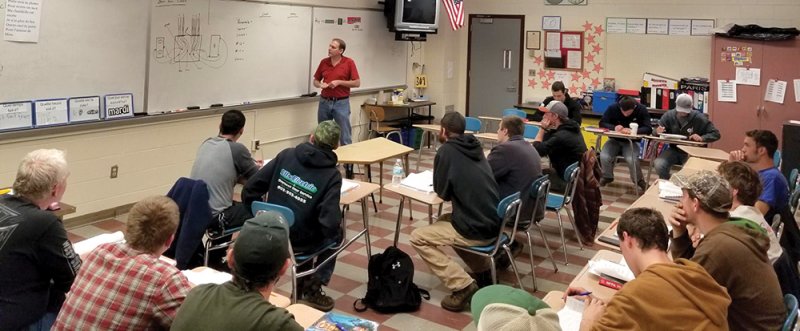
Hamilton Richardson teaches Electrical Apprenticeship at Keene Community Education. Courtesy of Hamilton Richardson.
Richardson started at Hamblet as an apprentice and has been with the company for 23 years. He teaches second-year electrical apprenticeship students at KCE. In conjunction with the Department of Education, KCE also offers apprenticeship programs in plumbing, machining and welding.
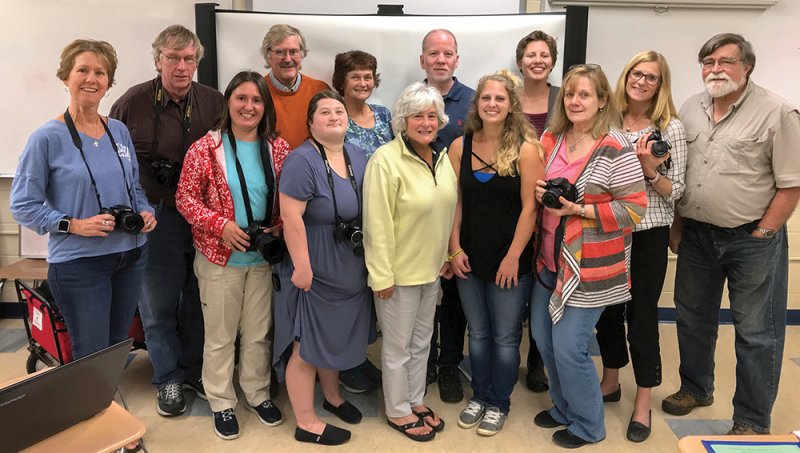
Digital Photography class at Keene Community Education. Courtesy photo.
Preparing Adult Learners
Strand says not everyone in the adult education pipeline is ready for workforce training. More likely, she says, they need services to help lift them out of poverty. Many already have jobs, but the pay is so low, they can’t support themselves. They need solutions to hunger and housing, child care and transportation.
Strand says she’s encouraged to work with business partners who want to increase opportunities for low-skilled adults. However, she offers a caveat: “Workforce goals are not appropriate for all adult students, and employment outcomes should not be the only way success is measured for the individual or the program.”
